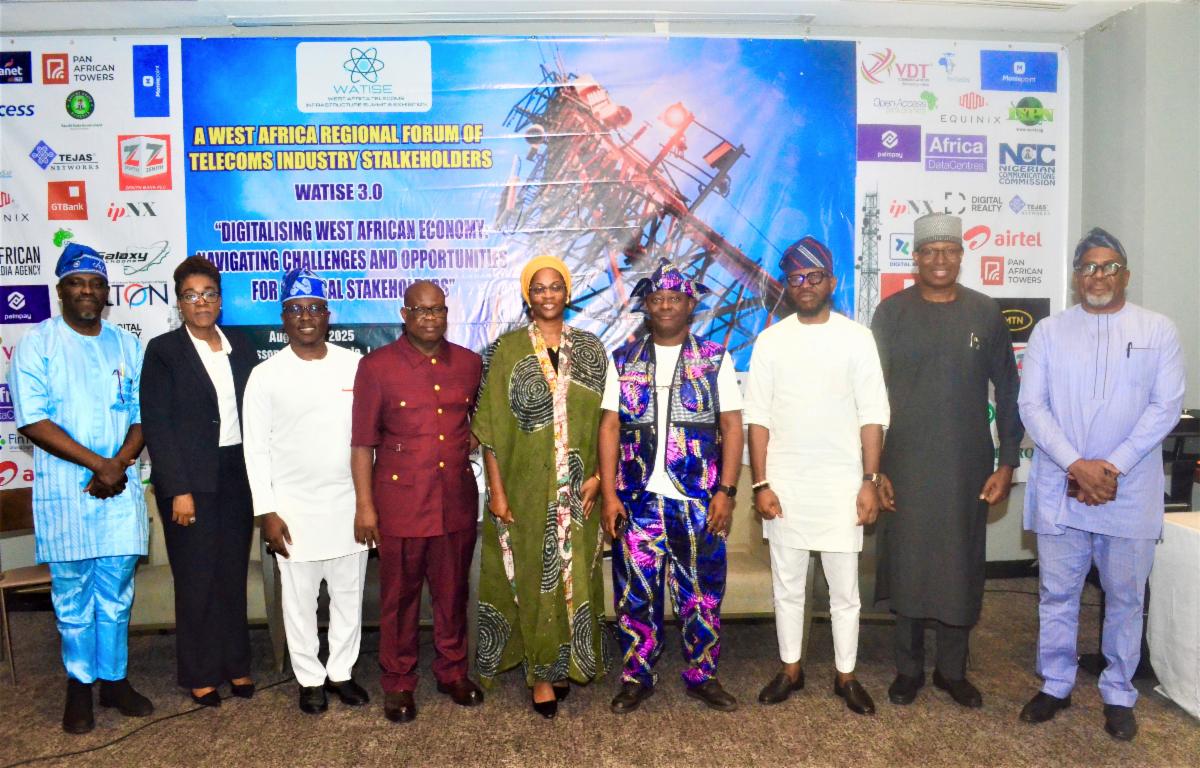The 2025 West Africa Telecommunications Infrastructure Summit & Exhibition (WATISE), held at the Radisson Blu Hotel in Lagos, concluded with a unified call for strategic partnerships, inclusive digital policies, and infrastructure protection to accelerate the region’s digital economy.
Themed “Digitalising West African Economy: Navigating Challenges and Opportunities for Critical Stakeholders,” the summit convened key figures from telecom, fintech, and government sectors to chart a collaborative path forward.
Engr. Gbenga Adebayo, Chairman of the Association of Licensed Telecommunications Operators of Nigeria (ALTON), noted that the telecom sector is experiencing renewed growth, with investment levels reaching their highest since before the COVID-19 pandemic.
He emphasized that telecommunications remain the backbone of the digital economy, powering banking, education, commerce, healthcare, and emergency services. However, he warned that issues like vandalism, multiple taxation, and Right of Way restrictions continue to hinder expansion.
Adebayo commended Nigeria’s tax reform initiative, which aims to reduce over 56 levies by January 2026, and urged other ECOWAS states to create enabling environments for digital infrastructure rollout.
Tony Emoekpere, President of the Association of Telecommunications Companies of Nigeria (ATCON), stressed that the next decade will determine West Africa’s position in the global digital economy.
He argued that harmonizing policies, building infrastructure, and fostering collaboration could unlock unprecedented economic growth, create millions of jobs, and empower the region’s youth to compete globally.
He encouraged investors to see beyond the risks, highlighting West Africa as a frontier market with the potential to double its digital economy contribution to GDP within ten years.
Dr. Nnenna Achife, Head of Commercial Business at AfriGo Payment Financial Services Limited, presented on how AfriGo is transforming card payments through technology and inclusion.
She explained that AfriGo has helped reduce operating expenses via transparent pricing and local currency billing, while also supporting government welfare programs.
The platform enables instant merchant credit and same-day settlements, ensuring steady cash flow for businesses and promoting a cashless economy through affordable electronic payment options.
Achife also highlighted AfriGo’s offline payment capabilities and the effectiveness of the embedded NIBSS Quick Response Code (NQR) for peer-to-peer and merchant transactions, especially in areas with unreliable internet access.
Adewunmi Adesina, Managing Director of Trade Lenda, emphasized the need for collective action to unlock the full potential of digitalization.
He called on governments to invest in infrastructure and harmonize digital policies across ECOWAS, while urging private sector players to build scalable platforms that serve underserved communities.
He also encouraged development partners to support capacity-building and digital inclusion programs. Adesina shared that Trade Lenda is helping micro and small businesses access credit through digital channels, enabling sustainable growth.
Jameelah Sharrieff-Ayedun, Vice President of FintechNGR and CEO of CreditRegistry, warned against the risk of “digital apartheid,” where millions of Africans remain excluded from the formal economy.
She advocated for inclusive access to data and credit through innovative use of alternative data sources such as mobile usage and e-commerce activity. Without action, she cautioned, Africa’s youthful population could become a missed economic opportunity.
A fireside chat led by Chidi Ajuzie, CEO of WTES Project Limited, and a panel session moderated by robotic engineer Racheal Anorue explored pressing challenges such as rising USSD costs, poor connectivity, and risks faced by mobile agents.
Panelists agreed that stronger collaboration, public sensitization, and technology-driven infrastructure security are essential to advancing financial inclusion and reducing transaction costs.
At the summit’s close, participants issued a collective call to action: protect telecom infrastructure from vandalism, harmonize digital policies across ECOWAS, reduce the cost of USSD and digital transactions, invest in workforce training and cybersecurity, and foster regional collaboration to unlock West Africa’s trillion-dollar digital economy potential.
The summit ended on a note of optimism, with stakeholders confident that sustained investment, inclusive strategies, and regulatory reform will position West Africa’s telecom and fintech sectors as engines of economic transformation across the sub-region.
![]()



























































